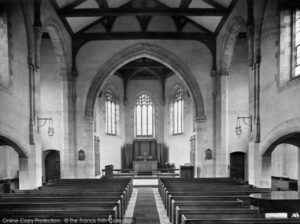Oakham school memorial chapel interior in 1927
In his autobiography The Seven Storey Mountain, Thomas Merton wonders why his parents, given their scrupulousness about keeping their sons’ minds uncontaminated by ugliness and sham hadn’t bothered to give any formal religious training. Merton remembers one day wanting to go to church. He could hear church bells and the sounds of the birds singing.
‘I cried out to my father:
“Father, all the birds are in their church.” And then I said: “Why don’t we go to church?” My father looked up and said: “We will.” “Now?” said I. “No, it is too late. But we will go some other Sunday.”’
Merton’s mother went to Quaker meeting and on one occasion, after she had gone to hospital, Merton went to the Quaker meeting house with his father. His father explained that people sat in silence until the spirit moved someone to speak. He also explained that the founder of the Boy Scout movement in the US – called Dan Beard would be there.
‘I sat among the Quakers with three more or less equal preoccupations running through my mind. Where was Dan Beard? Would he not only be called Beard, but have one on his chin? And what was the Holy Spirit going to move all these people to do or say.’
Staying with his grandparents whilst his mother was so ill, Merton did finally get to church: ‘One came out of church with a kind of comfortable and satisfied feeling that something had been done that needed to be done, and that was all that I knew about it.’
The description that I like best about Merton’s experiences of religion as a child is when he is at Oakham School in England, where there was daily chapel and one hour a week of religious instruction, “Buggy” Jerwood is the school chaplain: ‘… his religious teaching consisted mostly in more or less vague ethical remarks, an obscure mixture of ideals of English gentlemanliness and his favourite notions of personal hygiene.’ His very appearance encapsulated standing for ‘fair- play and good sportsmanship’. Merton describes Buggy Jerwood’s greatest sermon on Corinthians chapter 13 as typical of him and his whole church.
‘” Buggy’s” interpretation of the word “charity” … was that it stood for “all that we mean when we call a chap a ‘gentleman’”. In other words, charity meant good-sportsmanship, cricket, the decent thing, wearing the right kind of clothes, using the proper spoon, not being a cad or a bounder.
And so, Buggy Jerwood substituted the word gentleman for charity whenever it occurs …’
Merton describes how all the boys listened tolerantly to this, but adds that St Paul and the apostles would have been surprised that Christ had gone through the entire torture and torment of the Passion just so that all the boys at Oakham might become gentlemen.
